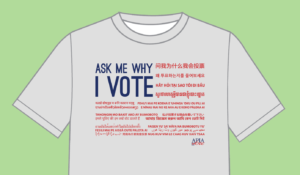 The old adage one person, one vote doesn’t seem to apply in the presidential election for people of color.
The old adage one person, one vote doesn’t seem to apply in the presidential election for people of color.
An analysis by the Center for Economic and Policy Research has found Asian American votes are only worth 0.93 of 1 vote, Latinos 0.91, Blacks 0.95 and Whites 1.0
How can that be? Under the electoral college system, a candidate gets all the state’s electoral college votes whether they win by one vote or one million. Under the system, large states such as New York and California are underrepresented.
Minorities are clustered in those larger states. White voters tend to live where their votes count more.
In Wyoming, there’s an electoral vote for every 195,000 residents. North Dakotans get one electoral vote for every 252,000 residents and Rhode Island gets one vote for every 264,000 votes. As the Center for Economic and Policy Research “In the electoral college, White votes matter more.”
You may have heard that Donald Trump won the electoral college vote, but Hillary Clinton won the popular vote. Those votes are still being counted, but right now, Hillary Clinton leads by 947,579 votes.
This is the second time in the last five presidential election where the presidential winner failed to win the popular vote. That’s lead to calls to change the system.
The group National Popular Vote is urging states to pass legislation to give their electoral votes to the candidate who wins the popular vote. That can only happen if the states with a majority of electoral votes pass the same legislation.
AsAmNews has Asian America in its heart. We are an all-volunteer effort of dedicated staff and interns. You can show your support by liking our Facebook page at www.facebook.com/asamnews, following us on Twitter, sharing our stories, interning or joining our staff.

RE:Asian American votes are worth less than Whites and Black Votes: This is a fascinating analysis of the electoral collage and demographics. I wouldn't have read works of the Center for Economic and Policy Research without your article. So one electoral vote equates to different number of popular votes in different states. How about California vs. WY, ND, or RI?